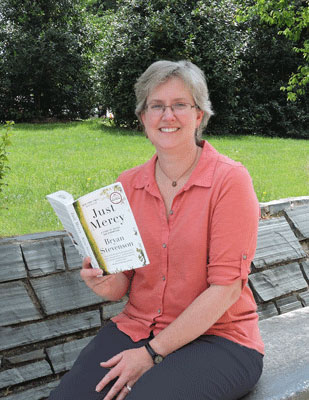
Dr. Saundra D. Westervelt
- Sociology
- Professor, 2016
Just Mercy: A Story of Justice and Redemption
by Bryan Stevenson
Bryan Stevenson started the Equal Justice Initiative (EJI) in Montgomery, Alabama over 25 years ago to provide legal services to inmates condemned to death who had never been provided competent legal counsel. At that time, Alabama was executing people at an alarming rate, primarily poor people of color who were herded through the criminal justice system as if cattle to the slaughter. Over these last 25 years as he looked deeper and deeper into our system of justice, he sadly found injustice around every turn – fourteen year olds automatically sentenced to life in prison without parole for non-homicide offenses, children condemned to death and housed with adults who subjected them to sexual violence, children housed in solitary confinement for decades, black people sentenced to death by all-white juries in all-white courtrooms where legal counsel were barely present and completely silent ... and the list goes on. In Just Mercy, he uses his own experiences fighting for those inside our system to illuminate where our retributive system of criminal processing has led us.
The thread that ties it all together is the story of Walter McMillian, a black man convicted and sentenced to death for killing a young white woman in Monroeville, Alabama in the 1980s. (Monroeville is the home of To Kill a Mockingbird author Harper Lee.) Stevenson details how it became clear through his investigation that Walter's real crime was his illicit affair with a white woman, an affair that put him in the crosshairs of an all-white justice system whose culture was more in tune with the racial politics of the 1920s than the 1980s. Due solely to Stevenson's efforts, Walter was eventually fully exonerated and released, becoming the 50th innocent person exonerated and released from death row in the U.S. But his case revealed the depth of many of the problems plaguing our justice system – racial bias, prosecutorial abuse that goes unchecked, misuse of snitches by punishing lack of cooperation and rewarding perjury, lack of punishment for official misconduct, poor support for indigent legal defense services.
Thanks to Bryan, I had the opportunity to meet and interview Walter for my own work on the post-exoneration experiences of death row exonerees. Walter talked with me about how difficult it was to get his life back after being housed on death row and fearing execution. He talked with me about his need to tell everyone of his innocence and to reclaim his identity as a reputable, worthy human being. He talked with me about his frustrations over how the 'system' can do this to him with no repercussions and offer him no assistance after release. But this book is important to me for more than just my own encounters with its main protagonist. This book is important because it brings to life, in living, breathing color, the humanity of those we have been discarding over the last twenty years in the name of our 'war on drugs' and 'war on crime.' It makes clear that retributive justice is no justice at all and that as a society we lose our humanity when we fail to see the humanity in others. It is a clarion call for change that must be heeded. We simply cannot continue to treat those most disadvantaged with such hostility and disregard. It is time for us to learn the value of mercy.
View title in library catalog